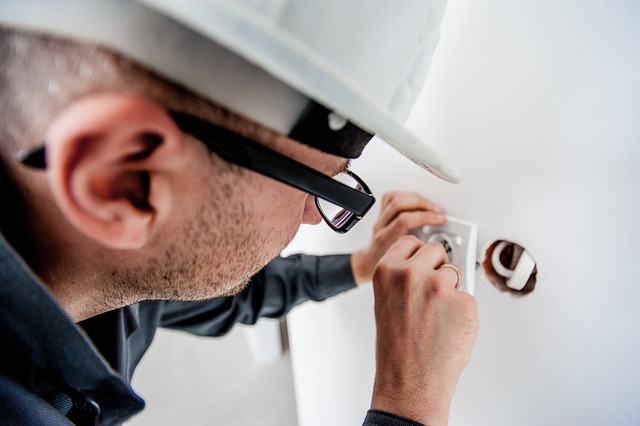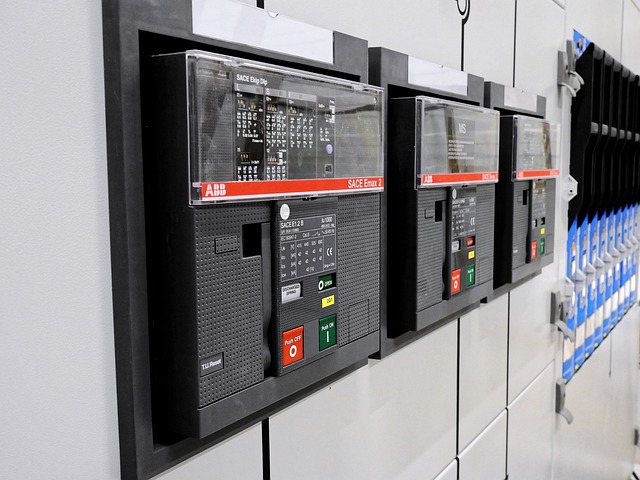Homeowners should be familiar with their electrical panel's layout and function, particularly the main breaker and individual circuit breakers. A professional electrician can provide essential guidance on managing your home's power distribution safely, including how to reset tripped breakers. Regular inspections and maintenance by a licensed electrician are key to identifying potential hazards like overloads or outdated electrical systems that could cause fires or power failures. For older homes, upgrading the electrical panel can enhance both safety and energy efficiency. It's crucial to address common issues such as recurrent breaker trips and ensure compliance with current safety standards. Outdated panels like Federal Pacific or Zinsco models may require replacement. Professionals can spot signs of wear that could lead to failure and determine if repairs or an upgrade are necessary for the electrical system to perform optimally. Prompt action through expert services is essential to protect your home from the risks associated with faulty electrical panels. Regular, professional inspections are recommended to maintain the integrity and efficiency of your home's electrical system.
When it comes to your home’s electrical system, your service panel acts as a critical hub—ensuring safe and reliable power distribution. However, over time, these panels can develop issues that may compromise safety and efficiency. This comprehensive guide delves into the intricacies of diagnosing and resolving common electrical panel problems, emphasizing the pivotal role of professional electricians in maintaining your home’s electrical health. From recognizing signs of wear to understanding the nuances of circuit breaker types and sizes, we’ll navigate through regular maintenance, essential safety checks, and the importance of timely upgrades. With a focus on energy efficiency and adherence to safety standards, this article equips you with the knowledge to troubleshoot like an expert and make informed decisions about your home’s electrical system.
- Understanding Electrical Panels and Their Role in Home Safety
- Common Issues with Electrical Panels That Signal a Need for Professional Help
Understanding Electrical Panels and Their Role in Home Safety

Electrical panels serve as the heart of a home’s electrical system, distributing power from the service drop to various circuits throughout the household. A qualified electrician can elucidate that these panels, also known as circuit breaker boxes or distribution boards, are critical for managing the flow of electricity and ensuring safe operation. Homeowners should be familiar with their electrical panel’s location and its components, including the main breaker and individual circuit breakers. Understanding how to reset a tripped circuit breaker or interpreting the lights and switches within the panel is essential for maintaining a safe and functional home electrics system.
Safety is paramount when dealing with electrical panels. An electrician can provide expertise in identifying potential issues such as overloaded circuits, worn-out wiring, or obsolete equipment that could pose fire risks or lead to power outages. Regular inspections and maintenance by a professional are key to preventing electrical hazards. Upgrading an older electrical panel to a modern one with additional capacity and safety features can significantly enhance home safety and energy efficiency. It’s advisable to consult with a licensed electrician for any concerns or upgrades related to your home’s electrical system, ensuring that it meets current safety standards and can handle the demands of modern technology and appliances.
Common Issues with Electrical Panels That Signal a Need for Professional Help

When it comes to maintaining the safety and efficiency of your home’s electrical system, understanding common issues with electrical panels is crucial. Frequent circuit breaker trips, which occur when the panel cannot handle the electrical load, are a clear indication that your electrical system may be overtaxed and professional intervention is needed. This situation can lead to power outages or even fire hazards if not addressed promptly by a licensed electrician. Another common issue is the presence of outdated or unsafe panels, such as Federal Pacific or Zinsco panels, which are known for their propensity to fail. These older models may no longer comply with current safety standards and should be assessed and potentially replaced by an expert in electrical systems.
Additionally, signs of wear, such as discoloration or excessive heat around the breakers or service panel, can signal impending failure and necessitate a professional assessment. An electrician can determine whether these symptoms are indicative of a repairable issue or if a complete replacement of your electrical panel is necessary for optimal performance and safety. Regular inspections by a qualified electrician can also identify potential problems like outdated wiring or inadequate capacity, which could compromise the integrity of your home’s electrical system. Addressing these issues promptly through professional help ensures the protection of your home and its inhabitants from the dangers associated with faulty electrical panels.
In concluding our exploration of electrical panels and their critical role in home safety, it’s clear that regular inspection and maintenance by a qualified electrician are paramount for the well-being of any household. Recognizing common issues that necessitate professional intervention, such as circuit overloads, faulty breakers, or signs of aging and wear, can prevent potential hazards and ensure your electrical system operates efficiently and safely. Homeowners should take proactive steps to work with licensed electricians for routine checks and upgrades to their electrical panels, thus safeguarding their homes against the risks associated with outdated or malfunctioning systems. By doing so, one not only contributes to the longevity and functionality of their property but also protects their family from the dangers of electrical failure.
